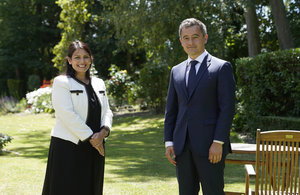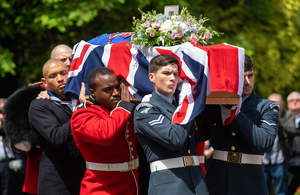Priti Patel and new French Interior Minister agree action on Channel crossings
Press release
Agreement reached to create an intelligence cell to crack down on gangs facilitating illegal crossings and people smuggling

Priti Patel met the new French Interior Minister Gérald Darmanin today (Sunday 12 July) to discuss how the French and UK governments can do more to tackle illegally-facilitated Channel crossings by small boats.
It was the newly appointed French Interior Minister’s first meeting with an international counterpart. The two ministers reiterated their determination to stop the crossings and bring the ruthless criminal gangs behind them to justice.
The Home Secretary and M Darmanin reaffirmed their shared commitment to returning boats in the Channel to France, rather than allowing them to reach the UK.
Through a Declaration of Intent, it was agreed that a Franco-British Operational Research Unit to combat migrant smuggling will be established.
Home Secretary Priti Patel said:
I have been in France today seeing first-hand the significant work undertaken on that side of the Channel to address the unacceptably high levels of small boats, alongside the efforts of Border Force and the National Crime Agency in the UK.
But despite all of the action taken by law enforcement to date – intercepting the boats, making arrests, returning people back to France and putting the criminals responsible behind bars – the numbers continue to increase.
This simply cannot be allowed to go on. Today, I have signed an agreement with the French to create a joint intelligence cell which will crack down on the gangs behind this vile people-smuggling operation and impressed on my French counterpart the need to stop these illegal crossings for the benefit of both our countries. This is the start of a new operational approach with the newly appointed French Interior Minister.
The new unit will collate, centralise and analyse operational intelligence to prevent crossings from taking place and to dismantle the gangs behind them.
It will be staffed by French and UK officers and will feed into the already established teams working tirelessly to end the illegally-facilitated crossings.
Both the Home Secretary and M Darmanin stressed that migrants should not risk their lives to reach the UK, given France is a safe country with a well-run asylum system.
The Home Secretary also paid tribute to the work of law enforcement agencies on both sides of the Channel. In 2019 UK Immigration Enforcement made 418 arrests, leading to 203 convictions for a total of 437 years. Of these 259 arrests and 101 convictions were for people smuggling.
Published 12 July 2020
